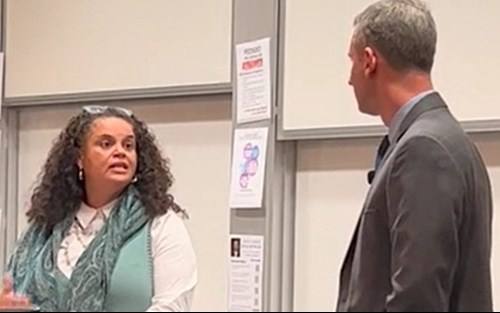That’s the implied message so far in a series of columns taking on the state of America’s top 10-ranked law schools. J. Christian Adams and Hans A. von Spakovsky, both attorneys, are tag-teaming the project with alternating entries at PJMedia.com.
The Adams-von Spakovsky series is called “Do They Teach Law Anymore?” Their findings make it a fair question.

Readers may not be surprised to find examples of classrooms that suppress free speech, but the duo has also unearthed facts of course offerings that may raise eyebrows, such as a class at No. 1-ranked Yale entitled “Decentralized Resistance.”
“That is the name of the course," Adams told American Family Radio podcast host Sandy Rios this week. "And they study things like squatting, graffiti, military desertion, and mutiny. And not in the sense that they're wrong, but in the sense of how they're part of a social phenomena that we can value."
In other words: street-level activism. For example, that Yale class on "Decentralized Resistance' teaches:

Most social movement organizations are the result of accumulation and coalescence of everyday resistance. In other words, Change agents. Most things that are positive start as everyday resistance and then the accumulation of numerous acts of everyday resistance, this is from the course catalog, can precipitate quasi revolutionary change.
Adams said he often lets the schools themselves tell his readers what they’re teaching by taking facts and information from their own course catalogs.
No. 2-ranked Stanford, in the piece written by von Spakovsky, offers a course called “Rationalism, Contrarianism and Bayesian Thinking in Politics: How to Think Better?”
A class in San Francisco thinking
The course description praises the rise of San Francisco Bay-area “thinkers” from a decade ago. It concedes that some may oppose “Bayesian Thinking” but points out that “Rationalism” has become a brand in Silicon Valley and is “hugely influential among pundits and executives.”
“Rationalism” is a mandatory first-year class at Stanford Law.
 No. 3-ranked University of Chicago Law School offers a course entitled “Public Law in the Time of Trump.”
No. 3-ranked University of Chicago Law School offers a course entitled “Public Law in the Time of Trump.”
This seminar helps students explore Trump’s “controversial policies and actions” and helps prepare their response to contemporary events. It is entirely on Zoom and is led by invited speakers.
“They just pile on these crazy anti-Trump law professors to come and teach the class. It’s astonishing that they're getting course credits for this, and it certainly isn’t helping anybody learn how to practice law,” Adams told Rios. “And that's what law schools are supposed to be about, you learn these treasured institutions we have of right to jury trials, limited government, the meaning of contracts. What are property rights, what do they mean? Instead they're just replacing with Marxism.”
 Stanford Law School made news in March when a mob of students shouted down Fifth Circuit Judge Stuart Kyle Duncan (pictured at right), who was appointed by Trump in 2018. He later called the protest a "struggle session," referring to Mao Zedong's fanatical and murderous Red Guards.
Stanford Law School made news in March when a mob of students shouted down Fifth Circuit Judge Stuart Kyle Duncan (pictured at right), who was appointed by Trump in 2018. He later called the protest a "struggle session," referring to Mao Zedong's fanatical and murderous Red Guards.
A law school DEI dean is on leave after the event, when it was learned she organized the mob, and the law school’s dean detailed the school’s response in a 10-page letter.
Affecting your life, and liberty, for years to come
“Basically it was a complete breakdown of discourse at Judge Duncan's speech. And you might say, why? Why were they doing this?" Adams told the AFR podcast. "Well, because he's conservative, he's pro-life. He believes in the Constitution."
 Every American believed in those principles going back to our country's founding, Adams added, but believing them now makes you a hated target. So the current state of our laws should concern everyone.
Every American believed in those principles going back to our country's founding, Adams added, but believing them now makes you a hated target. So the current state of our laws should concern everyone.
“This is not just some sort of quirky zoo show going on," the attorney warned. "This is going to affect your lives because the people who graduate from these law schools become the elite power holders...These people are going to be in power 20 or 30 years from now."







